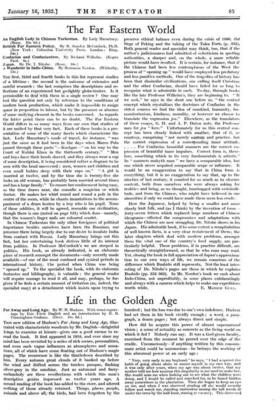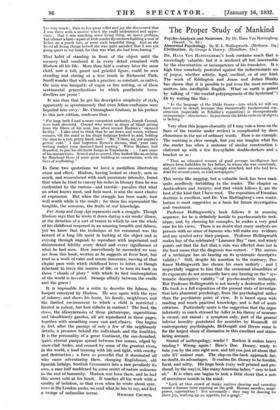Life in the Golden Age
Far Away and Long Ago: By W. H. Hudson: With wood engrav- ings by. Erie Fitch Ds.glish and as introduction by B. Cunningham Graham. (Dent. 10s. 8d.)
Tins new edition of Hudson's Far Away and Long Ago, illus- trated with characteristic woodcuts by Mr. Daglish—delightful hinge to examine at leisure—gives one a good excuse to re- read the book. It first appeared in 1918, and ever since my Mind has been revisited by a series of rich scenes, personalities, and even such vague influences as atmospheres and sensa- tions; all of which have come floating.out of Hudson's magic Pages: The recurrence-Is like the thistledown described by him. Every autumn great clouds of it banked up before the wind and drifted across the treeless pampas, flashing silver-grey in the sunshine. Just as autumnal and faery- melancholy are these recollectimis with .which .this man's descriptive genius , impressed us twelve years ago. A second reading of the book has added to the store, and altered nothing of those already retained. Things, places, people, animals and above all,- the birds, 'had been forgotten by the
hundred ; but the loss was due to one's own indolence. Hudson
had set them in his book vividly enough ; a word, a para- graph; a dozen pages ; but always direct and simple.
How did he acquire this power of almost supernatural vision ; a sense of actuality as concrete as the living world on which it fed ? Nobody can say. It was a God-given faculty, exercised from the moment he peered over the edge of the cradle. Unconsciously-Lif anything written. by this consum- mate artist could be unconscious--he betrays the working of this abnormal power at an early age : " Very, very early in my boyhood," ho says, " I had acquired the habit of going about alone to amuse myself in my own way, and it was only after years, when my age was about twelve, that my mother told me how anxious this singularity in me used tornake her. She would miss me when looking out to see what the children were doing, and I would be called and searched for, to be found hidden away somewhere in the plantation. Then she began to keep an eye on me, and when I was observed stealing off she would secretly follow and watch me, standing motionless among the tall weeds dr under the trees by the half-hour, staring at vacancy. This distressed her very much ; then to her great relief and joy she discovered that I was there with a motive which she could understand and appre- ciate ; that I was watching some living thing, an insect perhaps, but oftener a bird—a pair of little scarlet flycatchers building a nest of lichen on a peach tree, or some such beautiful thing. And as she loved all living things herself she was quite satisfied that I was not going queer in my head, for that was what she had been fearing."
That habit of standing in front of the object until the memory had mastered it in every detail remained with Hudson all his life. More than half a century later the same child, now a tall, gaunt and grizzled figure, could be seen standing and staring at a tree trunk in Richmond Park. Small wonder that with such a practice, so constant, so native, the man was incapable of vague or fine writing, or of these sentimental generalizations to which pantheistic town- dwellers are prone !
It was thus that he got his descriptive simplicity of style; apparently so spontaneously that even fellow-craftsmen were beguiled into envy. Mr. Cunningham Graham, in his preface to this new edition, confesses that :
" For long, both I and amore competent authority, Joseph Conrad, were both deceived. Conrad who wrote in drops of blood arising from the fibres of his soul, has often envied Hudson's damned facility.' I also used to think that he sat down and wrote, without erasure, till the maid in his dingy lodgings looked in and, holding the door in a red, grimy hand, said : Mr. 'Udson, sir, yer supper's gettin' cold.' I had forgotten Byron's dictum, that `your easy writing makes your damned hard reading.' When Hudson had departed, to join his old horse Zango in Trapalanda . . . I saw some of his manuscripts. Scored and re-scored, they looked like an etching by Muirhead Bono of some great building in construction, with its tiers of scaffolding."
in these two quotations we have a medallion illustrating cause and effect. Hudson, having looked so closely, seen so much, and remembered with such passionate intensity, found that when he tried to convey his riches in literary form he was confronted by the curious—and terrible—paradox that what an artist knows most, and feels most, is also the most elusive of expression. But when the struggle has been made, how well worth while is the result ; for there lies represented the . tangible, the sensuous, the fruits of real knowledge.
Far Away and Long Ago represents such a struggle. Though Hudson says that he wrote it clown during a six weeks' illness, at the dictation of a sort of trance in which he saw the whole of his-childhood reopened in an amazing breadth and fulness, yet we know that the technique at his command was the reward of a long life spent in looking at the object and in striving through anguish to reproduce with impersonal and disinterested fidelity every detail and every significance of what he had seen. How marvellously he succeeded we may see from this book, written as he suggests at fever heat, but read as a work of calm and serene innocence, moving at that elegiac pace with which childhood loves to loiter, as though reluctant to leave the sources of life, or to turn its back on those " clouds of glory " with which its first contemplation of the world is invested. Strange affinity between the cradle and the grave !
It is impossible for a critic to describe the fulness, the bouquet conveyed by Hudson. He sees again with the eyes of infancy, and shows his home, his family, neighbours, and the limited environment to which a child is restricted : limited in extent, but how infinite in content! The food, the dress, the idiosyncrasies of those picturesque, superstitious and bloodthirsty gauchos, all are reproduced in these pages, together with something more vast and elusive. One begins to feel, after the passage of only a few of the neighbourly details, a presence behind the individuals and the localities. It is the personality of a great Continent, the sun-drenched, quiet, eternal pampas spread between two oceans, edged by snow-clad Andes, and crossed by some of the greatest rivers in the world, a land teeming with life and light, with cruelty and destruction ; a force so powerful that it dominated all who came adventuring there, changing Englishman, old Spanish hidalgo, Scottish Covenanter into a race peculiarly its own, a race half maddened by some secret of nature unknown to the rest of humanity. Hudson was born there, and he had this secret cold at his heart. It touches all his work with a quality of isolation, so that even when he wrote about spar- rows in the London parks, we read what he has to say, and feel



































 Previous page
Previous page